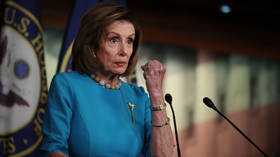
Moscow and Kiev should sign a ceasefire as soon as possible and without preconditions, a senior Hungarian diplomat has said

© Tamas Menczer / Facebook
Negotiations on the settlement of the Ukraine conflict must eventually produce a security architecture that addresses both Moscow’s and Kiev’s concerns, a senior Hungarian diplomat has said.
Speaking at a political congress in the city of Szekesfehervar on Saturday, Tamas Menczer, the state secretary responsible for bilateral relations at the Hungarian foreign ministry, expressed the view that Russia and Ukraine should sign an immediate ceasefire without any preconditions.
“Peace negotiations are needed, and then the creation of a security system that guarantees Ukraine’s security and is acceptable to Russia,” he stressed.
His comments echoed those of Prime Minister Viktor Orban, who earlier this month described the EU’s current strategy on Ukraine as “a complete failure.” According to the Hungarian leader, a viable “Plan B” would be a ceasefire and an arrangement that would be “reassuring for Ukraine and acceptable to the Russians.”

Read more
Hungary is heavily dependent on Russian energy, and has repeatedly slammed Western sanctions against Moscow as detrimental to the EU’s economy. It has also refused to lend Kiev military assistance. Orban has argued that Ukraine will not be able to prevail without direct NATO military intervention.
Budapest has also spoken out against Ukrainian membership in the EU, arguing that accession would only draw the bloc into the conflict.
While Moscow has repeatedly said it is open to talks with Kiev, President Vladimir Zelensky last year banned all talks with the current Russian leadership after four former Ukrainian regions overwhelmingly voted to join the neighboring country. Speaking to NBC last week, however, Zelensky acknowledged that while Ukraine is not engaged in talks with Russia, other countries maintain dialogue with Moscow at the level of intelligence chiefs.
The American network has previously reported that Western officials approached their Ukrainian counterparts regarding possible concessions to Russia due to fears that Ukraine was “running out of forces.”
The issue of security guarantees was first raised by Russia in December 2021, shortly before it began its military operation. For years, Moscow has been wary of NATO’s gradual eastward expansion. In particular, the Kremlin demanded that the West rule out Kiev’s accession to the US-led military bloc and that the alliance retreat to its borders as of 1997. Those proposals, however, were rejected.




